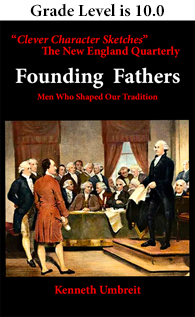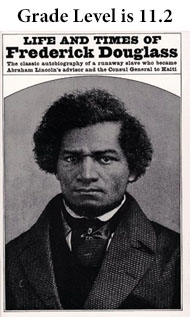Founding Fathers by Kenneth Umbreit
The epub format below is for your Apple and Android devices including Send-to-Kindle.
As you may know, Amazon has changed to the epub format to use with the Send-to-Kindle program. A great feature of the Send-to-Kindle program is that the file will go directly to your Library folder, and not have to be searched for in ES File Explorer or another app. If you use the mobi format in Send-to-Kindle, you will now get an error message. You can see instructions about Send to Kindle at https://www.amazon.com/gp/sendtokindle/email.
If you or your students want to download directly from this web site to an Amazon device, you can use the mobi format below. When you find the mobi file in ES File Explorer, it will then open in the Kindle app on your tablet. If you download an epub file to your Amazon tablet, it will also open if you have an app such as Overdrive on your tablet. The Kindle app offers an excellent reading experience to start with. Overdrive may need some customization of font size. Download mobi file here.
Clever Character Sketches
I found this book delightful. Kenneth Umbreit is a storyteller. Here is the lead sentence from the chapter on George Washington. “The deeper one delves into the record the more evident it becomes that if it had not been for George Washington there would never have been a United States.” This pulled me into the chapter; I needed to know how Washington helped launch the United States.
He respects the Founders but is not worshipful. He writes of their beliefs and courage and tenacity in accounts that are both readable and instructive. A reviewer wrote that Umbreit wrote “clever character sketches.” And even though the book was written over a generation ago, Umbreit’s point of view is modern. He notes defects. He did not ignore Jefferson’s backward views on slavery and wrote that he stayed “safe” on slavery in order not to offend fellow plantation owners.
The first chapter on Thomas Jefferson is a little complicated. Umbreit explains the influences of common law and natural law and the beliefs of the Anglo-Saxons in England on Jefferson’s thinking. Easier starting points are the chapters on Sam Adams, Patrick Henry and John Hancock. The reading level of Sam Adams is 9.7, Patrick Henry 10.1. and John Hancock, 9.2. The first chapter on Thomas Jefferson is 10.9.
Reviews at the time the original publication were positive. “Umbreit’s book is the work of a historical scholar with a flair for popularizing biography and drawing clever character sketches,” wrote Roy F. Nichols in The New England Quarterly. “Skillful strokes make intriguing portraits of Jefferson, John Adams, Hancock, Samuel Adams, Patrick Henry and George Washington. …One gets the impression that somehow Jefferson is the villain of the piece. Hancock is displayed as an astute self-serving politician whose vanity made it possible for clever men to use him. John Adams appears as usual. Samuel Adams and Patrick Henry are master politicians with the latter treated more gently than usual of late because the author thinks him the victim of Jefferson’s talent for “the assassination of reputation.” The hero is Washington, without whom Umbreit thinks “there would never be a United States.” Umbreit thinks of him as one of the “fierce men” in history,” like William the Conqueror with a talent for organization and money-making. Thus these six men are portrayed with a wealth of detail illuminating the complexities of their characters.”


